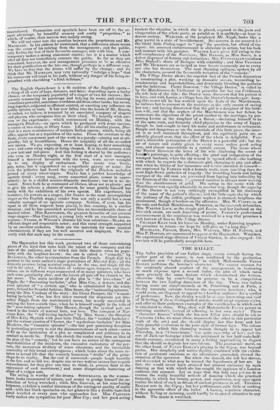The English Opera-house is a fit emblem of the English
opera— a thing of all sorts of haps, fortunes, and fates; depending upon a lucky chance, or the temporary popularity of a singer or two for success ; fre- quently renouncing its parentage and belying its name, and counting sometimes powerful, sometimes worthless aid front other lands; but never, long together, subjected to efficient control, or exerting any influence on i public opinion or taste. It has now fallen into the hands of Mr. BALFE, or rather, we believe, is tenanted by an associated company of singers and plavers, who recognize hint as their chief. We heartily wish sue- CCSS to the experiment ; which commenced on Monday, with the manager's Diadesic,—art opera which he produced with sonic success, a season or two .since, at Drury Lane. Like all his similar pieces, Dia- deste is a mere reminiscence of modern Italian operas ; which, being all alike, appear but as a repetition of the same. From the overture to the finale, every component part of the work is a parody—aiming not at ori- ginality, but at resemblance. Hence the insipidity of all the so-called new operas. We go, expecting, or at least hoping, to hear something new ; and conic away angry at being cheated. It is the old sermon with a new text and tail-piece. And this feeling is shared by the audience ; who even on Monday night, at the first start of a new manager, himself a deserved favourite with the town, were never wrought up to any display of enthusiasm. The music was lively, gay, noisy, but it engendered no sympathetic gayety or noise : for even the galleries had heard the originals of the Diadeste melodies ground on every street-organ. BALFE has a perfect knowledge of operatic detail : every song,. every concerted piece, comes in appro- priately : he is a skilful musco-dramatic mechanist ; but he is no in- ventor, Notes bath he at command ad libitum, ideas not so plenty: and to give his scheme a chance of success, he must gratify himself but rarely with the exhibition of his own operas. His experience, his resources, his powers as a singer, (for BALris is the most accomplished singer on the English stage,) render hint not only a useful but a most valuable manager of an operatic company. Seldom, if ever, has his equal in all these respects been placed, in this country, in a similar situation: and he has assembled around him no inconsiderable share of musical talent. Miss RAINFORTH, the greatest favourite of our present stage-singers—Miss Coma:TT, a young lady with an excellent mezzo- soprano—FRASER, in WILSON'S absence his best substitute—BLAND, an efficient singer and respectable actor ; and this vocal strength supported by an excellent orchestra. Here are the materials for some musical entertainment, if they are but well assorted and displayed. We sin- cerely wish that such may be the result.


























 Previous page
Previous page